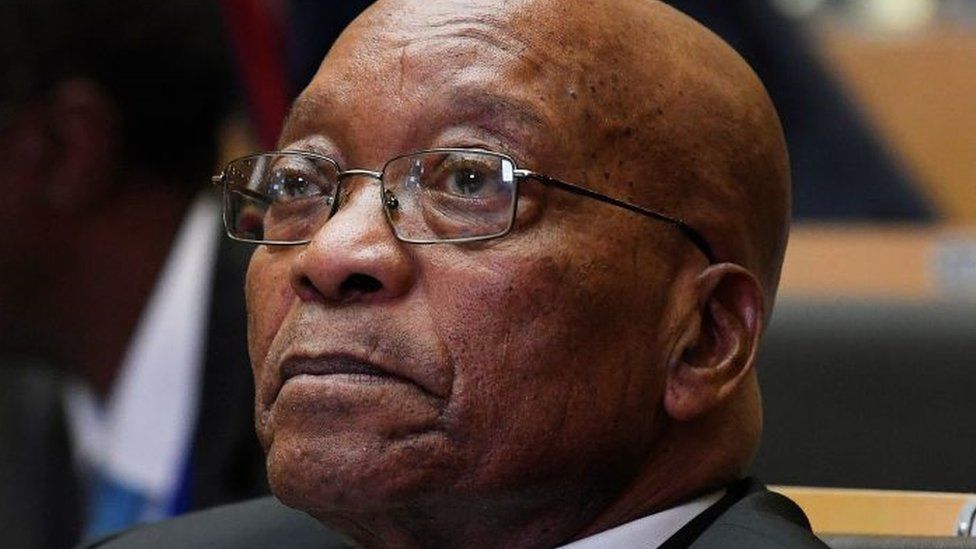South Africa's Jacob Zuma: From freedom fighter to president to jail
- Published

Jacob Zuma has achieved political ignominy as the first former president of South Africa to be sent to prison.
His life as a free man - who enjoyed the perks of a former president - ended just before midnight local time, when in a dramatic scene he was escorted by a convoy of vehicles from his home in rural Nkandla to a prison in the small town of Estcourt.
His son, Edward Zuma, had warned that there would be "blood on the floor" if he was arrested, but in the end there was none.
The 79-year-old surrendered, knowing that he could not resist the might of the state, leaving behind his son who had earlier stood by the gate of their home with a stick.
Edward Zuma, the eldest son of the ex-president, is known for his fiery rhetoric
Zuma was once a celebrated political figure.
He was imprisoned for 10 years in 1963 for fighting the racist system of apartheid in South Africa, then went into exile in 1975 to become the spymaster of the African National Congress (ANC), before returning to South Africa triumphantly in 1990, and rising to the presidency in 2009, though by then his reputation had been stained by a deluge of corruption allegations.
Humble roots
He had also been charged with raping a family friend, but was acquitted in 2006 in a trial that deeply polarised the ANC, the former liberation movement which became the governing party in 1994 and of which Zuma has been a member since the age of 17.
Now, he has been imprisoned for being in contempt of a court made up of South Africa's most senior judges - those who are the guardians of the democracy he fought for most of his life.
Jacob Zuma's signature song used to be the liberation anthem Bring Me My Machine Gun
Earlier this month, the judges of the Constitutional Court sentenced him to 15 months in prison for ignoring an order to appear before an official inquiry investigating the corruption allegations he faced during his nine-year presidency - especially his relationship with the notorious Gupta brothers who fled South Africa in 2018 as the legal noose closed in on them.
They have all denied the allegations, and Zuma insists that his political enemies are using the courts to target him.
Having fought racial oppression in South Africa at the height of the Cold War between the US and the now-defunct Soviet Union, Zuma is still steeped in this mentality, casting himself as the victim of a political conspiracy hatched by Western powers - and their "puppets" in South Africa - to thwart his attempts at ending the economic power of white people in the country.
For his critics, the former freedom fighter from a poor rural family became intoxicated by power once the liberation struggle was won and - along with his new business friends - looted the state's wealth on a grand scale.
Jacob Zuma's home in Nkandla was controversially upgraded with government money
Where the truth lies is yet to be established but it is a tribute to South Africa's 27-year-democracy that a former freedom fighter and president has been imprisoned for trying to evade accountability over his time in office.
It shows that South Africa's democratic institutions - often battered by politicians - remain strong, and judges, policemen and government officials are still prepared to uphold the rule of law by jailing a man whom some of them personally know and with whom they were once in the trenches of the liberation struggle.
Most high-profile prisoner
Moreover, judges have been scrupulously fair towards Zuma, giving him a hearing at every opportunity as he waged in the courts what became known as the Stalingrad strategy - fighting point-by-point every attempt to put him on trial for his alleged high crimes.
Jacob Zuma is facing multiple corruption charges
On Friday, a judge will rule on whether or not to revoke his arrest, and on Monday the highest court of the land will hear his request to overturn his conviction for contempt.
This is unprecedented in South Africa, and the months ahead are likely to be more dramatic as Zuma is tried, in a separate case, on charges of corruption related to a $5bn (£3bn) arms deal in the 1990s.
He is facing more than 15 counts of racketeering, corruption, fraud, tax evasion and money laundering - charges to which he pleaded not guilty during a court appearance in May.
With Zuma fighting legal battles on various fronts, the big question is: Will he ultimately win and walk free, or will he gain even more notoriety as South Africa's most high-profile prisoner?
Zuma's legal woes:
2005: Charged with raping family friend - acquitted in 2006
2005: Charged with corruption over multi-billion dollar 1999 arms deal - charges dropped shortly before he becomes president in 2009
2016: Court orders he should be charged with 18 counts of corruption over the deal - he appealed, but in 2017 lost a bid to overturn them
2016: Court rules he breached his oath of office by using government money to upgrade private home in Nkandla - he has repaid the money
2017: Public protector said he should appoint judge-led inquiry into allegations he profiteered from relationship with wealthy Gupta family - he denies allegations, as have the Guptas
2018: Zuma approves inquiry into claims of state looting
2018: The National Prosecuting Authority confirms Mr Zuma will face prosecution for 12 charges of fraud, one of racketeering, two of corruption, and one of money laundering, relating to the arms deal, which he denies
2021: Begins a 15-month jail sentence after the Constitutional Court orders his arrest for refusing to testify at the commission into state looting